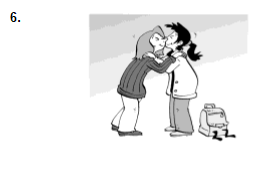Top Notch 2 – Unit1
Top Notch 2 – Unit1
You can take this test once only! Are you sure?
Test Summary
0 of 25 questions completed
Questions:
Information
You have already completed the test before. Hence you can not start it again.
Test is loading…
You must sign in or sign up to start the test.
You must first complete the following:
Results
Results
0 of 25 questions answered correctly
Your time:
Time has elapsed
You have reached 0 of 0 point(s), (0)
Earned Point(s): 0 of 0, (0)
0 Essay(s) Pending (Possible Point(s): 0)
Categories
- Not categorized 0%
- 1
- 2
- 3
- 4
- 5
- 6
- 7
- 8
- 9
- 10
- 11
- 12
- 13
- 14
- 15
- 16
- 17
- 18
- 19
- 20
- 21
- 22
- 23
- 24
- 25
- Current
- Review
- Answered
- Correct
- Incorrect
-
Question 1 of 25
1. Question
Part 1
Listen to the conversation. Then choose the name of the person who has done each activity.
Example:

 CorrectIncorrect
CorrectIncorrect -
Question 2 of 25
2. Question
 CorrectIncorrect
CorrectIncorrect -
Question 3 of 25
3. Question
 CorrectIncorrect
CorrectIncorrect -
Question 4 of 25
4. Question
 CorrectIncorrect
CorrectIncorrect -
Question 5 of 25
5. Question
 CorrectIncorrect
CorrectIncorrect -
Question 6 of 25
6. Question
 CorrectIncorrect
CorrectIncorrect -
Question 7 of 25
7. Question
 CorrectIncorrect
CorrectIncorrect -
Question 8 of 25
8. Question
Part 2
Complete each sentence using a participial adjective. Follow the example.
Example: A: The speaker fascinated us with her talk.
B: It was a ……fascinating……. lecture.
-
8. A: That dog frightens everyone in the neighborhood!
B: I am certainly of him!
9. A: The call from the doctor’s office relieved me.
B: I felt when I told my mother about the call.
10. A: The hike up the mountain exhausted Manny.
B: Manny took a nap after the hike.
CorrectIncorrect -
-
Question 9 of 25
9. Question
Part 3
In each row, choose the word or phrase that does NOT belong in the category.
Example: topics for small talk: the weather
huggingyour job11. greetings:
CorrectIncorrect -
Question 10 of 25
10. Question
12. tourist activities:
CorrectIncorrect -
Question 11 of 25
11. Question
13. gestures:
CorrectIncorrect -
Question 12 of 25
12. Question
Part 4
Choose the word that correctly completes each sentence.
Example: Have you had gelato ( [yet] / ever )?
14. I’ve ………….. been to India, but I’d like to go again.
CorrectIncorrect -
Question 13 of 25
13. Question
15. Have they ………….. been to the top of the Sears Tower in Chicago?
CorrectIncorrect -
Question 14 of 25
14. Question
16. Sarah has eaten Mexican food, but she hasn’t tried sopapilla …………… .
CorrectIncorrect -
Question 15 of 25
15. Question
17. You don’t need to introduce us. I’ve met Les ………… .
CorrectIncorrect -
Question 16 of 25
16. Question
Part 5
Complete the sentences using the present perfect. Do not use contractions.
Example: A: ……..Have you eaten……… (eat) yet?
B: No, we haven’t. Shall we eat together?
-
18. A: I (go) to China three times.
B: Wow! I am going for the first time next week.
19. A: (see) the new Brad Pitt movie yet?
B: No, they haven’t. They’re going to see it tonight.
20. A: I arrived in New York a few days ago
B: (go) sightseeing yet?
21: A: My mom (take) so many great pictures with her digital camera.
B: Nice! Can I see some of them?
22: A: (speak) to the new student yet?
B: No, but I plan to speak to her after school today.
23: A: I (not learn) how to use this computer.
B: You haven’t? But it’s so easy to learn!
CorrectIncorrect -
-
Question 17 of 25
17. Question
Part 6
Choose the sentence in each pair that is written correctly.
Example: a. I never been a good student.
✓ b. I have never been a good student.
24.
CorrectIncorrect -
Question 18 of 25
18. Question
25.
CorrectIncorrect -
Question 19 of 25
19. Question
26.
CorrectIncorrect -
Question 20 of 25
20. Question
Part 7
Read the article. Then choose the correct answer for each question.
Mean What You Say: The Art of Conversation
It’s always a good idea to study the language of a foreign country before you travel there. But speaking with someone from another country can involve more than just words in a different language. People in different countries can have very different customs when they speak.
People in Indonesia, for example, always want to be agreeable and polite, and this means that they don’t like to say “no.” In their native language (Bahasa Indonesia), there are many ways to say “yes.” But twelve of these “yes” words actually mean “no”!
Australians are friendly with people, but they value directness. Australians prefer a clear, direct response, even if it is not the one they wanted.
The French appreciate the art of conversation, which can include arguing as a form of entertainment. In this case, speakers may interrupt each other frequently. This is considered active participation in the conversation by both people. It is better than one person lecturing the other.
As in many other Latin American countries, titles are very important in Costa Rica. People’s titles can indicate their professions, such as Doctor (doctor) or Ingeniero (engineer). Licenciado is used when talking to someone with a college degree. If someone doesn’t have a professional title, Señor (Mr.), Señora (Mrs.), or Señorita (Miss) are appropriate.
Example: In which country do people dislike saying no directly?
a. France
b. Australia
[c. Indonesia]
d. Costa Rica
27. Australians prefer to
CorrectIncorrect -
Question 21 of 25
21. Question
28. In Indonesia, it is considered polite to
CorrectIncorrect -
Question 22 of 25
22. Question
29. What can you expect to find during an argument in France?
CorrectIncorrect -
Question 23 of 25
23. Question
30. In conversation, Costa Ricans like to
CorrectIncorrect -
Question 24 of 25
24. Question
Writing Test
1. What is a custom in your country for greeting someone you have never met before? What is acceptable behavior for meeting a stranger? Use at least two sentences to describe how to greet someone new.
-
This response will be reviewed and graded after submission.
Grading can be reviewed and adjusted.Grading can be reviewed and adjusted. -
-
Question 25 of 25
25. Question
2. Tell about a thrilling, fascinating, or frightening experience you’ve had. Write at least two sentences.
-
This response will be reviewed and graded after submission.
Grading can be reviewed and adjusted.Grading can be reviewed and adjusted. -

